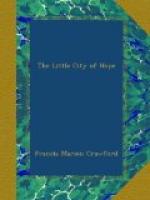HOW A MAN AND A BOY FOUNDED THE LITTLE CITY OF HOPE
Overholt’s boy came home from school at the usual hour with his books buckled together in an old skate strap, which had never been very good because the leather was too soft and tore from one hole to the next; but it served very well for the books, as no great strain was caused by an arithmetic thumbed to mushiness, a history in the same state, and a geography of which the binding gave in and doubled up from sheer weariness, while the edges were so worn that the eastern coast of China and Siberia had quite disappeared.
He was a good-looking lad, not tall for his age, but as tough as a street cat in hard training. He had short and thick brown hair, a clear complexion, his father’s energetically intellectual features, though only half developed yet, a boldly-set mouth, and his mother’s kindly, practical blue eyes. For surely the eyes of practical people are always quite different from those of all others; and not many people are practical, though I never knew anybody who did not think he or she was, except pinchbeck artists, writers, and players, who are sure that since they must be geniuses, it is necessary to be Bohemians in order to show it. The really big ones are always trying to be practical, like Sir Isaac Newton when he ordered a good-sized hole to be cut in his barn door for the cat, and a little one next it for the kitten.
But Newton Overholt did not at all resemble his great namesake. He was a practical young soul, and had not yet developed the American disease which consists in thinking of two things at the same time. John Henry had it badly, for he had been thinking of the tangent-balance, his wife, his boy, and the coming Christmas, all together, since he had got home, and the three problems had got mixed and had made his head ache.
Nevertheless he looked up from his work-table and smiled when his son came in.
“Everything all right?” he asked, with an attempt to be cheerful.
“Oh yes, fine,” answered the boy, looking at the motionless model for the five-hundredth time, and sticking his hands into his pockets. “I’m only third in mathematics yet, but I’m head in everything else. I wish I had your brains, father! I’d be at the head of the arithmetic class in half a shake of a lamb’s tail if I had your brains.”
So far as mathematics were concerned this sounded probable to John Henry, who would have considered the speed of the tail to be a variable function of lamb, depending on the value of mother, plus or minus milk.
“Well,” he said in an encouraging tone, “I never could remember geography, so it makes us even.”
“I’d like to know how!” cried the boy in a tone of protest. “You could do sums, and you grew up to be a great mathematician and inventor. But what is the good of a geographician, anyway? They can only make school-books. They never invent anything, do they? You can’t invent geography, can you? At least you can, and some boys do, but they go to the bottom of the class like lead. It’s safer to invent history than geography, isn’t it, father?”




